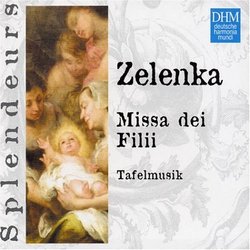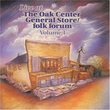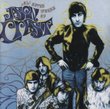| All Artists: Zelenka, Bernius, Tafelmusic Title: Missa Dei Filii Members Wishing: 0 Total Copies: 0 Label: Deutsche Harm Mundi Original Release Date: 1/1/2004 Re-Release Date: 3/29/2004 Album Type: Import Genre: Classical Styles: Chamber Music, Historical Periods, Classical (c.1770-1830) Number of Discs: 1 SwapaCD Credits: 1 UPC: 828766015928 |
Search - Zelenka, Bernius, Tafelmusic :: Missa Dei Filii
 | Zelenka, Bernius, Tafelmusic Missa Dei Filii Genre: Classical
|
Larger Image |
CD DetailsSimilar CDs
|
CD ReviewsZelenka's Late Masterpiece M. De Sapio | Alexandria, VA | 03/23/2008 (5 out of 5 stars) "The Bohemian-German composer Jan Dismas Zelenka (1678-1745) is becoming increasingly known as one of J.S. Bach's most fascinating and original contemporaries. More accommodating towards operatic and GALANT stylistic elements (especially in his later years) than Bach was, Zelenka's style is distinguished by daring invention, contrapuntal mastery, and an extravagant late baroque exuberance that seems to spill over the printed page. Zelenka wrote a series of Masses at the end of his life which appear to have been intended as an "independent work of art" without definite plans to be performed. One of these Masses, the MISSA DEI FILII (Mass of the Son of God), consists of only the Kyrie and Gloria, leading some scholars to believe that the composer died before completing the work. For me the standout portion of this Mass is the "Gloria in excelsis". In this movement Zelenka builds a mosaic out of a panoply of motifs, combined and manipulated within an astounding large-scale design and carried along by a chugging pulse of irrepressible joy; it is an overwhelming ten minutes of music. This 1990 recording (here reissued at budget price) is a key entry in the already considerable Zelenka discography. The vocal soloists (especially the wonderful countertenor Michael Chance) are excellent, the Tafelmusik orchestra airy and transparent (surprisingly, Zelenka stuck with the standard orchestra of strings and oboes for this work, rather than augment it with brass), and the chorus especially lovely in the celestial polyphony of the twice occurring "Kyrie" movement. Baroque aficionados take note: you owe yourself to become acquainted with this composer, especially this, his late (and perhaps unfinished) masterpiece." A voice teacher and early music fan George Peabody | Planet Earth | 02/15/2009 (5 out of 5 stars) "THE BAROQUE MUSICAL TRINITY: HANDEL, BACH AND ZELENKA.
If Handel and Bach are the first two members of the Baroque Musical Trinity then Jan Dismas Zelenka(1679-1745) is the third. From the opening 'Kyrie' of this beautiful Mass I was 'hooked'! Zelenka's entire repertoire only runs to some 150 compositions and consists of a small number of instrumental selections and a larger group of sacred vocal selections such as masses and requiems, psalms, magnificats, hymns and a few secular vocal works. The music on this disc is melodious, harmonically satisfying and very creative throughout both in the instrumental accompaniment and solos. His repeated use of ascending and descending scale passages ending in unusual harmonies is unique and pleasing to the ear as is the harmonic progressions throughout the composition. The 'Missa Dei Filii' ZWV20, is a mass in honor of the Son of God. As was usual in the first half of the 18th century, Zelenka's masses and litanies are so-called number works in which the five parts of the Mass(Kyrie-Gloria-Credo-Sanctus/Benedictus-Agnus Dei) are subdivded into smaller, musically independent single movements. Zelenka left nine large scale settings of various litanae, the 'Litanae Lauretenae' subtitled 'Salus Infirmorum' (the healer of the infirm) was composed in 1744. It has nine movements with varied ensemble groupings: Trio(S.A.T.), quartet (S.A.T.B.), three arias, one each for soprano, alto, tenor and four choruses, all of which are very well rendered on this disc and lovely to hear! It's difficult to understand why it took so long for Zelenka's music to surface, but fortunately for us, more and more is being discovered and recorded. Frieder Bernius, the director of this recording, has recorded several more of his works which can be found on this website and from other musical purveyors. All the music herein, as a whole, demands much technical ability and sometimes virtuosity for singers as well as instrumentalists. Just one example of this is: "Quoniam tu solus Sanctus II" as sung by Michael Chance in the 'Gloria'; it requires much flexibility and control, as you will hear for yourself if you purchase the recording. The overall performance on this 1989 recording is impressive partly because the excitement never ceases during the performance: Nancy Argenta(soprano) seems to be more involved emotionally than usual-Michael Chance (countertenor) is perfection exhibiting great control along with a rich full tone quality-Christopher Pregarden(tenor) has a warm and resonant delivery and Gordon Jones(bass) sings with ease and a lightness of sound. the Kammerchor Stuttgart is as usual smooth sounding with a lovely buoyancy and Tafelmusic is great as always ('bravo' Jean Lamon). And all brought skillfully together by the very capable Frieder Bernius." |

 Track Listings (19) - Disc #1
Track Listings (19) - Disc #1
